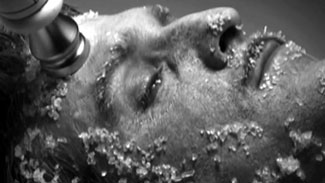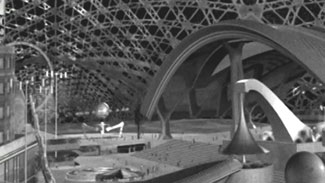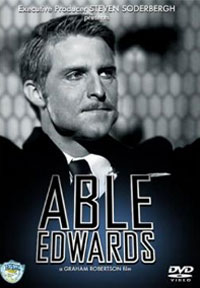 Civilization pods circle the toxic earth, in Able Edwards (2004).
Civilization pods circle the toxic earth, in Able Edwards (2004).
These "Civipods" are what some crackpot futurists have promoted as "L5 colonies" on the moronic theory that the human race, such as cannot help but pollute even an entire planet, & whose inventions & machines invariably break down & fail, would nevertheless be entirely capable of maintaining a perfect ecological balance if sealed inside tin cans that'll be oh so easily maintained.
The reality is that the sort of geeks who dream of living in such colonies rarely change their shorts & can't even take proper care of their own invariably tape-repaired glasses.
Such would inevitably be jettisoning themselves by accident into the vacuum of space, if not just dying of some hideous new swiftly-spreading disease that arose in their sewage, moldy pizza crusts, & scab-encrusted scalps.
Civipods are the final strongholds of civilization, such as hopes one day to be able to reclaim the surface of the world, supposing the new power-structure would even let anyone know it ever became safe. So unlike believers in the L5 colonization of space, well-told science fiction nearly always assumes, most credibly, a dystopian outcome, as well as large-scale malfunction of technologies.
The original Able Edwards (Scott Kelly Galbreath) was a beloved entertainment mogul obviously patterned on Walt Disney. Able died in 1960, when the Earth was still inhabited. His most popular character -- Harry Panda instead of Mickey Mouse -- was known throughout the world. He founded entertainment parks, Futuristic Wonderland, in California & Florida. Also like Walt, when Able died, he was preserved cryogenically.
Above the Earth in the polluted future, Able's DNA was obtained from the cyrogenic tank, to be used for cloning purposes. The stagnated Edwards Corporation that descended from Able Edwards' Studio no longer orchestrates family entertainment, but makes androids & is corporately in charge of the civipods. Their profits have become moribund, & needing to revitalize the company, they decied to resurrect their founder.
He's raised with an android-human hybrid, Gower (Steve Beaumont Jones), programmed to be little Able's best friend, but also as a spy on him for the corporation.
 Able's life from infancy on is manipulated to produce the same influences as on the original Able, so as to insure the same creative genius. This involves duplicating not only the good things in the founder's life, but the terrible things as well. Able's life from infancy on is manipulated to produce the same influences as on the original Able, so as to insure the same creative genius. This involves duplicating not only the good things in the founder's life, but the terrible things as well.
So at age twenty he was badly burned in a tube accident (the tubes unite the civipods). He recovers fully, but his girlfriend was killed. He's a much more serious clone thereafter, & a long time before he learns it was no accident & his first love was murdered by the corporation.
At twenty-five, he is permitted to take over the Edwards Corporation, but then the company begins to lose control of their creation. He immediately shuts down the android manufacturing & begins building a new Fantasy Wonderland.
In the civipods, entertainment has long been a matter of "virtual reality." Able the Second is intent on restoring "reality" & authenticity, including extinct animals cloned for a zoo, rides that can really move & can be touched.
Beautifully designed in black & white cinematography, the story is treated with a surprising earnestness, as a clone struggles for identity, autonomy, & civil rights for all clones & for the right of his family to inherit.
As his biography continues, we see him enter politics. We are with him as he discovers the falsehoods in his orchestrated life. We suffer with him over the realization of betrayals.
It's an odd, unique film that presents its science fiction premises with considerable novelty, unlike 99.999% of s-f movies which tend to fit a very few familiar patterns.
Which is not to say nothing like it has been done before, but it derives from the print medium. Even allowing that the filmmakers admit to patterning Able Edward's rise & fall on that of Citizen Kane (1941), the story-type is from pulp magazines of the 1950s, & highly reminiscent of the science fiction tales of Cordwainer Smith, Fred Pohl, C. M. Kornblkuth, or Clifford D. Simak.
Shot digitally on a micro-budget in front of a green screen, no actual sets were built, so there's an element of animation involved. The artifice is on some level a heightened reality, contributing as it does to story's presentation of civipods are places of mere "virtual" reality & artifice.
The end result is no work of genius, but a genuine achievement for low-budget filmmaking. Able Edwards represents an historic moment in cinematic method, & does complete justice to old-fashioned storytelling in the idea-driven pulp era.
copyright © by Paghat the Ratgirl
|

